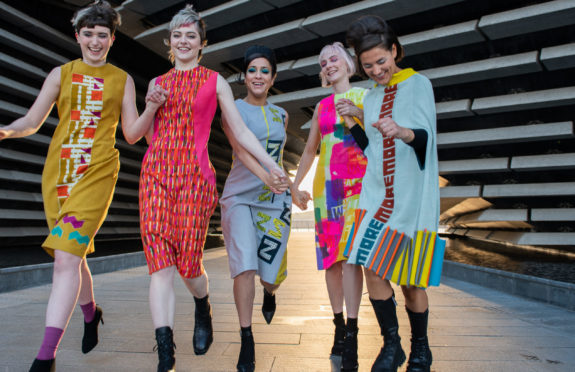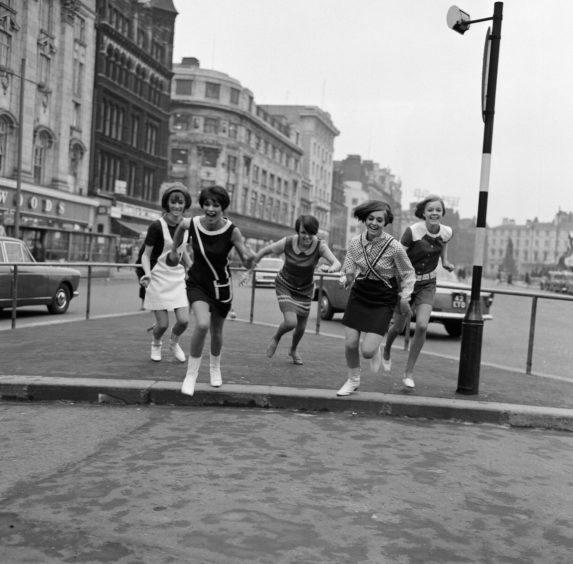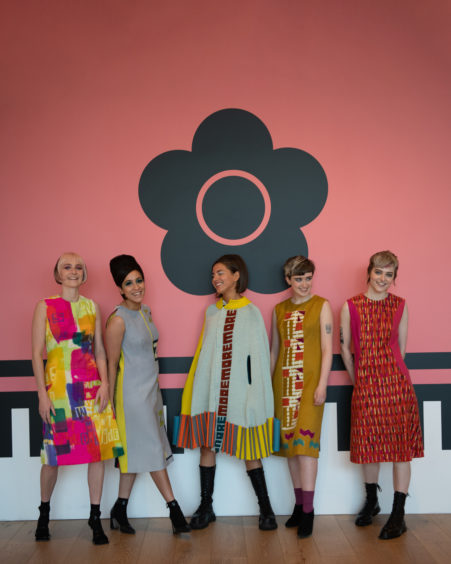
V&A Dundee has taken a trip back in time to the swinging sixties ahead of the opening of a fashion exhibition celebrating the work of Mary Quant.
An iconic photograph of the designer, taken in 1966, was recreated ahead of the launch next week.
The new images, shot on location inside and outside Scotland’s first design museum before it closed during lockdown, feature new textiles created by five emerging designers inspired by Quant’s work.
She changed the fashion system, overturning the dominance of Paris couturiers, and transformed young women like her into the new leaders of style.
Lucy Carrie, Emer Dobson, Sandra Junele, Humaira Khan and Jane Neave, all 3rd year Textile Design students at the University of Dundee’s Duncan of Jordanstone College of Art and Design, were presented with an opportunity to work with V&A Dundee earlier this year as part of a project titled 21st Century Quant, examining Mary Quant’s design legacy.
The new designers were asked to create textiles inspired by Quant’s 1960s rebellion, but also that responded to the big issues facing today’s fashion world. Detailed research and experimentation led them to explore urgent themes such as climate change, consumerism, and racism.
The textiles were then transformed into four dresses made to the exact specification of an original Mary Quant Butterick dressmaking pattern. The knitted cape designed by textile design student Sandra Junele was inspired by Quant’s famous Alligator cape, and references the importance of repurposing clothing waste as a way to tackle problems caused by fast fashion and over-consumption.
Emer Dobson created a repeat pattern using the outline of non-recyclable packaging to highlight the problem of sustainability and the issue of hidden waste.
She said: “I tried to think about how the last 60 years would have changed Mary Quant’s design process, her aesthetic and her ethos. The main thing I took from my research was that she wanted to design for everyone, was forward-thinking and quite a revolutionary.
“I looked at mass production and used the supermarket as my visual source, and the onslaught of advertising and bright colours. I used that as a starting place to critique mass production. I think Mary Quant probably would have had a similar take on things.
“Every time I had an idea I thought, ‘What would Mary do?’ I think she’d be annoyed by all of this. I think she would want sustainability.”
Lucy Carrie created a design inspired by graffiti text protesting against racism, while Jane Neave’s acid-bright design is inspired by Quant’s fashion statements which challenged gender stereotypes.
She said: “I really considered how Mary Quant looked, how she wore suits even though it wasn’t really done then. She designed with women, and what women wanted, in mind. Then I thought about this in relation to designing my textile and dress.”
Pharmacist turned textile designer Humaira Khan leveraged her scientific knowledge to create her dyes from scratch.
She said: “Measuring dyes in the lab was exactly like my work as a production pharmacist in which I handled all the raw materials in point zero one to thousands of litres. This experience formed an excellent basis for dyes I created for this project. Though it’s a complex process, I didn’t experience any difficulties.”
After the exhibition this year and graduation next, Humaira plans to establish her own textile design business.
“I want to do something with innovation and sustainability,” she said. “I want to make items that avoid landfill, I want to make longer-lasting products.”
Sophie McKinlay, Director of Programme at V&A Dundee said: “Mary Quant started out as a young art student, going on to become one of Britain’s best-known designers with a unique vision to use fashion as a way to communicate new attitudes and ideas. All of us at V&A Dundee have enjoyed taking a fresh look at Mary Quant’s legacy through the lens of these five young designers as they embark on their own design careers. We are delighted to celebrate Mary Quant opening at V&A Dundee with this inspiring and unique collaboration.”
Professor Anita Taylor, Dean at Duncan of Jordanstone College of Art and Design said: “21st Century Quant has been such an exciting project for our Textile Design students – their final designs boldly reimagine the spirit of Quant and present a fresh and feisty take on her transformational legacy and reflect and respond to current issues of climate change, social justice, and sustainability in the fashion industry. Congratulations to our emerging leaders of style!”
The 21st Century Quant shoot was the first time V&A Dundee has been used as a fashion shoot location. The new designers worked with fashion industry professionals, photographer Aleksandra Modrzjewska and stylist Kristen Neillie. A 2014 textile design graduate of Duncan of Jordanstone College of Art and Design, Kristen Neillie has gone on to work with Vogue, Dazed and Net-a-Porter.
The 21st Century Quant garments will be on display at V&A Dundee for the opening week of Mary Quant, on show outside the exhibition entrance.
The exhibition which focuses on the years between 1955 and 1975 will also feature the stories of women who made outfits from Mary Quant’s dressmaking patterns, gathered through V&A Dundee’s #SewQuant campaign, as well as a new film looking at contemporary female designers who, like Mary Quant, are forging their own way through today’s rapidly shifting fashion industry.

Enjoy the convenience of having The Sunday Post delivered as a digital ePaper straight to your smartphone, tablet or computer.
Subscribe for only £5.49 a month and enjoy all the benefits of the printed paper as a digital replica.
Subscribe © V&A Dundee / Howard Walker/Mirrorpix/Getty Images
© V&A Dundee / Howard Walker/Mirrorpix/Getty Images © Aleksandra Modrzjewska / V&A Dundee
© Aleksandra Modrzjewska / V&A Dundee